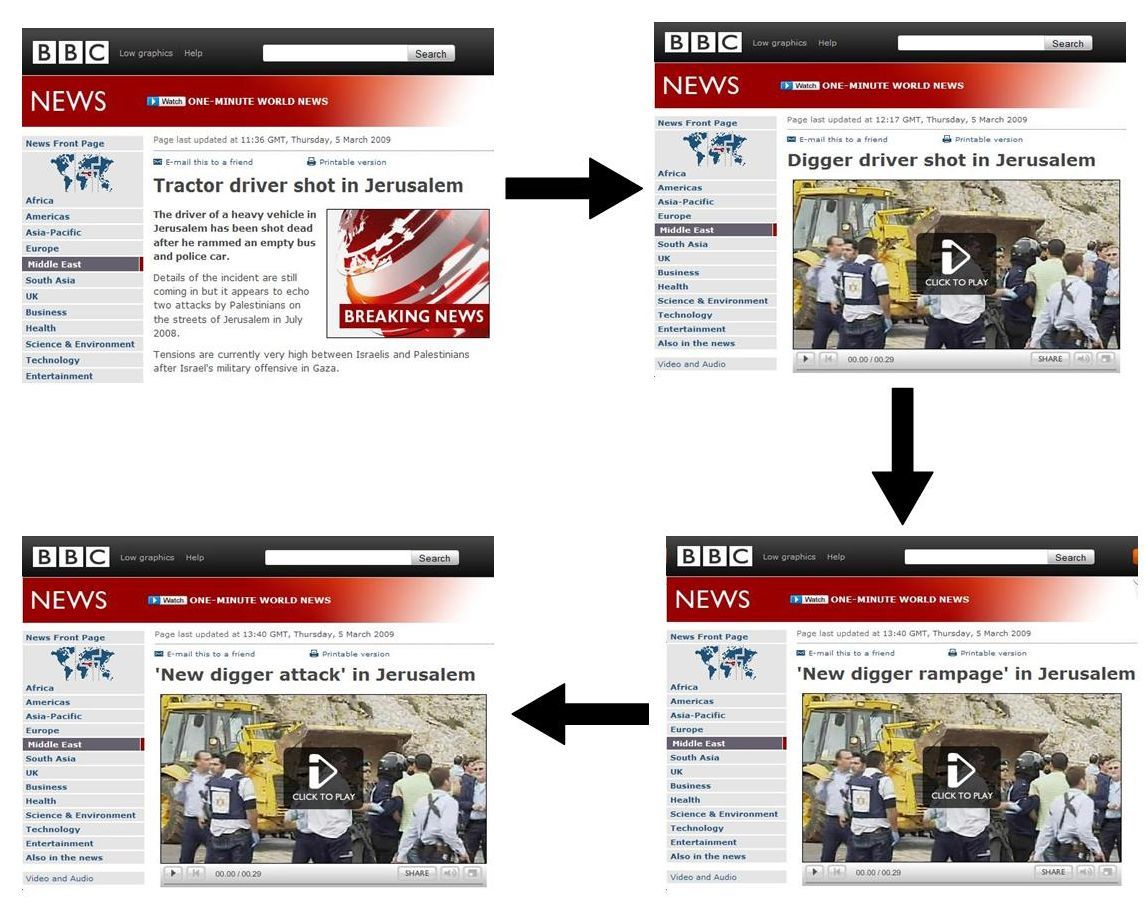 In July 2008, we caught the BBC’s shocking first response to a Palestinian bulldozer attack in Jerusalem. Offering a glimpse into the BBC’s warped journalism, the initial headline read “Israel bulldozer driver shot dead“.
In July 2008, we caught the BBC’s shocking first response to a Palestinian bulldozer attack in Jerusalem. Offering a glimpse into the BBC’s warped journalism, the initial headline read “Israel bulldozer driver shot dead“.
While the BBC later amended its headline, this example offered evidence of the BBC’s mindset – the initial instinct to portray Israel as an aggressor and a Palestinian as a victim even if that Palestinian was actively involved in a terrorist attack against innocent civilians.
Less than three weeks later, another Palestinian bulldozer attack took place. This time, in a virtual repetition of the first incident, the BBC’s initial response the second time was a headline questioning whether an attack had taken place at all. The headlines on the BBC’s web page went from “New Vehicle ‘Attack’ in Jerusalem” to “New Digger ‘Attack’ in Jerusalem,” then finally settled on “Israel Hit By New Digger Attack.”
Fast forward to March 5, 2009 – yet another bulldozer terror attack took place as a Jerusalem Arab rammed a bulldozer into a police car in the capital, wounding two officers before being shot dead. How would the BBC report this?
True to form, as the news broke, the BBC’s initial headline read: “Tractor driver shot in Jerusalem“. We watched as the headline evolved over the course of the next few hours. Bizarrely, in a semantic change, the next update read “Digger driver shot in Jerusalem“.
A short time later, the BBC finally acknowledged that an actual attack had taken place as the headline was amended to “‘New digger rampage’ in Jerusalem” before finally settling on “‘New digger attack’ in Jerusalem“. But why the quotation marks?

Evidently, somebody was sitting behind a computer giving some thought to the headlines and how to update the breaking news story. But once again, the BBC has demonstrated a clear trend that reflects negatively against Israel even when Israelis are the victims of a terror attack.
Headlines are important because they set the basis for the whole story, are the first thing the reader sees and the last message left in the reader’s mind.
Typical BBC headlines we found in HonestReporting’s past analysis of the BBC were: “Israelis kill militants in Gaza” (The “militants” had been firing rockets into Israel), “Children killed in Israeli strike” (the children were playing next to a rocket launcher), and “Israeli strike kills four in Gaza.”
On the other hand, in actions carried out by Palestinians, the headlines took the responsibility for the attacks away from those who instigated them. Rockets, explosions,and clashes became the culprits in typical headlines such as: “Rocket injures dozens in Israel,” “Gaza explosion kills two children“, “Two killed in clash in Gaza Strip,” and “West Bank clash leaves three dead.”
Once again, in this latest bulldozer attack, the culprit is not the Palestinian who carried it out but the vehicle itself. While “Israel” or “Israelis” regularly feature in BBC headlines, the same cannot be said for “Palestinians” or “Arabs” who carry out terror attacks.
You can send your comments to the BBC Complaints website – http://www.bbc.co.uk/complaints (for detailed instructions on how to navigate the BBC Complaints website, click here).
MORE RESPONSES TO THE BMJ
 The British Medical Journal’s attack on HonestReporting and the right of our subscribers to respond to anti-Israel media bias continues to elicit responses. In The Jerusalem Post, HonestReporting’s very own Social Media Editor, Alex Margolin writes:
The British Medical Journal’s attack on HonestReporting and the right of our subscribers to respond to anti-Israel media bias continues to elicit responses. In The Jerusalem Post, HonestReporting’s very own Social Media Editor, Alex Margolin writes:
Indeed, people like Sabbagh, who accuse H
onestReporting of stifling debate, are actually the ones seeking to suppress the voices of its readers – the people who express themselves through e-mails to editors. Considering the flood of negative media coverage Israel receives, there is no evidence that these complaints have had the effect Sabbagh describes.
In the Jewish Chronicle, Daniel Finkelstein, associate editor of The Times, writes an open letter to the BMJ:
Sabbagh’s piece strongly suggests that it is solely supporters of Israel who send abusive emails. I can attest that this is not the case. Perhaps the reason why the BMJ has not received, as I have, a large volume of abuse from people who dislike Israel is that it has never published anything that would give Israel’s opponents cause to complain. Wouldn’t a scientific paper on correspondence have attempted to look at responses to all sorts of different opinions on the Middle East?
In other words, the suggestion that this paper was peer reviewed is designed to give a scientific sheen to what was a polemic. Doctors will have assumed, on seeing that note about a peer review, that they were reading something that accorded to basic academic standards. They were not. Karl Sabbagh was not attempting to provide analysis. He was attempting to turn doctors against Israel and its supporters. Printing a page from a Jew who disagrees is not the point.
The point is subjecting papers to proper, scientific scrutiny. You did not do so. Instead, you lent your journal to propagandists and their agenda.

